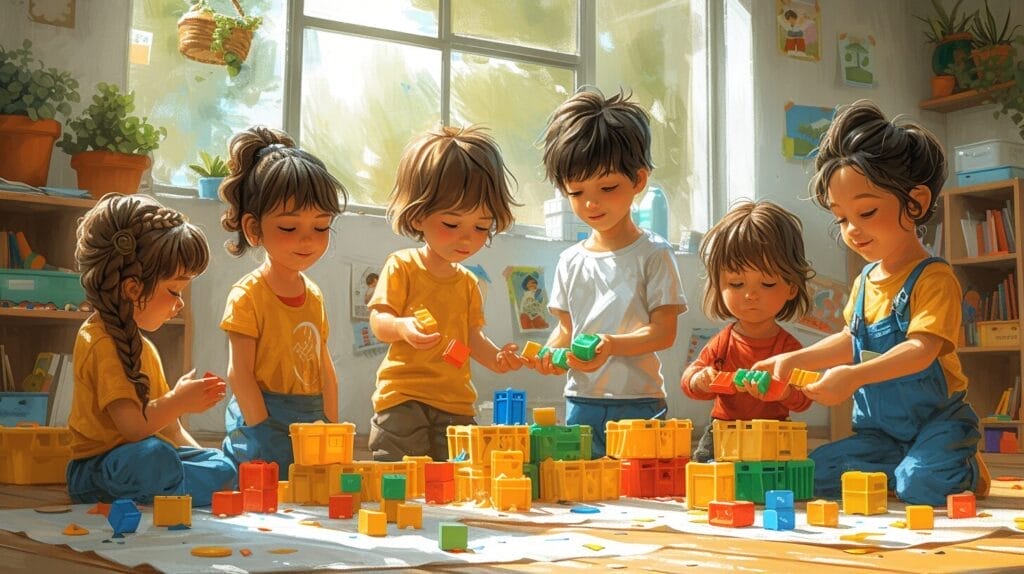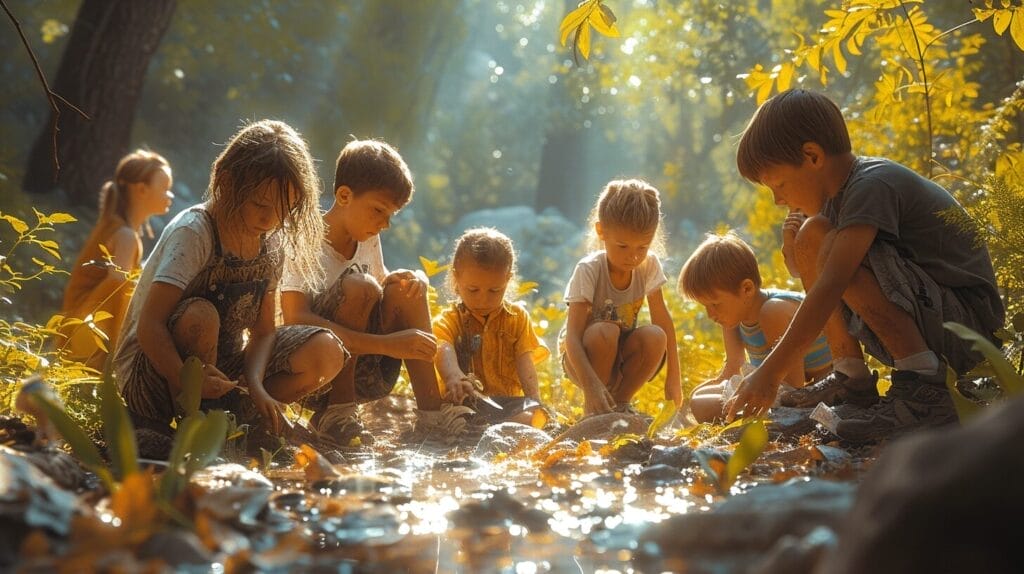As educators, our continuous objective is to pinpoint effective techniques that nurture youth development, steering them to fully realize their potential.
One approach that has gained significant recognition is the Montessori method, which focuses on understanding and supporting the unique developmental stages of children.
Let’s explore the fascinating world of Montessori developmental stages and discover how these stages play a crucial role in nurturing child development within Montessori schools.
Key Takeaways
- Montessori schools follow four planes of development to understand and support children’s physical, emotional, and cognitive changes.
- The first plane (birth to age 6) focuses on the absorbent mind, sensitive periods, independence, and nurturing environments.
- The second plane (ages 6 to 12) emphasizes curiosity, intellectual growth, social skills, moral development, and a love for learning.
- The third plane (ages 12 to 18) addresses the challenges of adolescence, identity formation, supportive environments, academic and career preparation, and self-reflection.
Understanding the Montessori Approach to Developmental Stages

Montessori schools focus on the individual child and their unique journey through four planes of development. This approach recognizes that child development isn’t linear, but rather a series of distinct stages.
These stages, known as the four planes of development, provide a framework for understanding the physical, emotional, and cognitive changes that occur during different periods of a child’s life:
- The first plane, from birth to age 6, is a critical period for physical and spiritual construction. During this time, children have a natural inclination to explore their environment. Montessori schools provide carefully prepared environments that allow children to freely choose activities that support their developmental needs.
- The second plane, from ages 6 to 12, is when children develop a vision of the universe and begin to discover their vocations. Montessori education at this stage focuses on cultivating the child’s imagination, curiosity, and sense of wonder.
- The third plane, from ages 12 to 18, is marked by rapid physical and emotional changes. Montessori schools support adolescent development by providing opportunities for self-expression, independence, and social interaction.
Finally, the fourth plane, from ages 18 to 24, encourages young adults to explore their interests and goals as they transition to adulthood and independence.
The First Plane of Development: Birth to Age 6

During the first plane of development, children actively engage in physical and spiritual construction, laying the foundation for lifelong learning and growth. Here are four key aspects of the first plane of development that contribute to the nurturing of child development in Montessori schools:
- The Absorbent Mind: Montessori schools capitalize on children’s incredible ability to absorb information from their surroundings, creating environments rich in sensory experiences.
- Sensitive Periods: These are stages of intense interest and learning, and Montessori schools respond to these by providing appropriate materials and activities.
- Development of Independence: Montessori schools foster independence by offering opportunities to engage in practical life activities.
- Role of the Teacher: Teachers act as guides and facilitators, observing each child’s unique needs and interests and providing individualized support.
The Second Plane of Development: 6 to 12 Years

The second plane of development, spanning from ages 6 to 12, is often referred to as the ‘golden age’ of childhood. Montessori schools recognize children’s natural inclination to learn about the world around them during this stage and foster this curiosity by offering a wide range of materials and activities.
In addition to intellectual development, Montessori schools also focus on nurturing social skills during this stage. Classrooms are designed to promote collaboration, empathy, and respect for others.
Furthermore, Montessori education places a strong emphasis on moral development. Children at this stage can understand abstract concepts such as justice, fairness, and responsibility.
The Third Plane of Development: 12 to 18 Years

In the third plane of development, spanning from ages 12 to 18, we witness significant physical and hormonal changes in adolescents. Montessori schools focus on creating a supportive environment that acknowledges and addresses these challenges.
Here are some key aspects of the third plane of development:
- Understanding the challenges of adolescence: Montessori schools help teenagers navigate this transformative phase.
- Identity formation: Adolescents begin to explore their sense of self and develop their values and beliefs.
- Academic and career preparation: Montessori schools guide adolescents in exploring different academic and career paths.
- Nurturing child development: Montessori schools prioritize the holistic growth of adolescents.
The Fourth Plane of Development: 18 to 24 Years

The fourth plane of development from ages 18 to 24 is a critical period of transition as individuals step into adulthood. Montessori schools recognize the importance of providing a nurturing environment that encourages self-reflection and self-discovery during this time.
During the fourth plane of development, Montessori schools support young adults as they pursue higher education or embark on their chosen career paths. In addition to academic pursuits, this stage also focuses on personal and emotional growth.
Conclusion
In conclusion, the Montessori developmental stages provide a comprehensive framework for understanding and nurturing child development within Montessori schools.
Montessori education progresses through planes of development: physical/spiritual construction, passion exploration, rapid changes, and preparation for adulthood.
Frequently Asked Questions
What is Montessori education and montessori developmental stages?
Montessori education is an educational approach developed by Dr. Maria Montessori, emphasizing independence, freedom within limits, and a holistic approach to child development.
How does the Montessori curriculum support the different stages of development?
The Montessori curriculum is designed to align with the different stages of child development, providing materials and activities that cater to each plane of development and the child’s changing needs and abilities.
What did Maria Montessori observe about child development?
Maria Montessori observed that children go through distinct developmental phases, each with its own unique characteristics and readiness for particular types of learning and growth.
How does the Montessori environment facilitate human development?
The Montessori environment facilitates human development by offering a carefully prepared space that promotes freedom of movement, exploration, social interaction, and the development of essential life skills.
How can parents help their child thrive in a Montessori classroom?
Parents can help their child thrive in a Montessori classroom by understanding and supporting their child’s unique developmental journey, encouraging independence, and aligning home routines and values with the principles of Montessori education.

